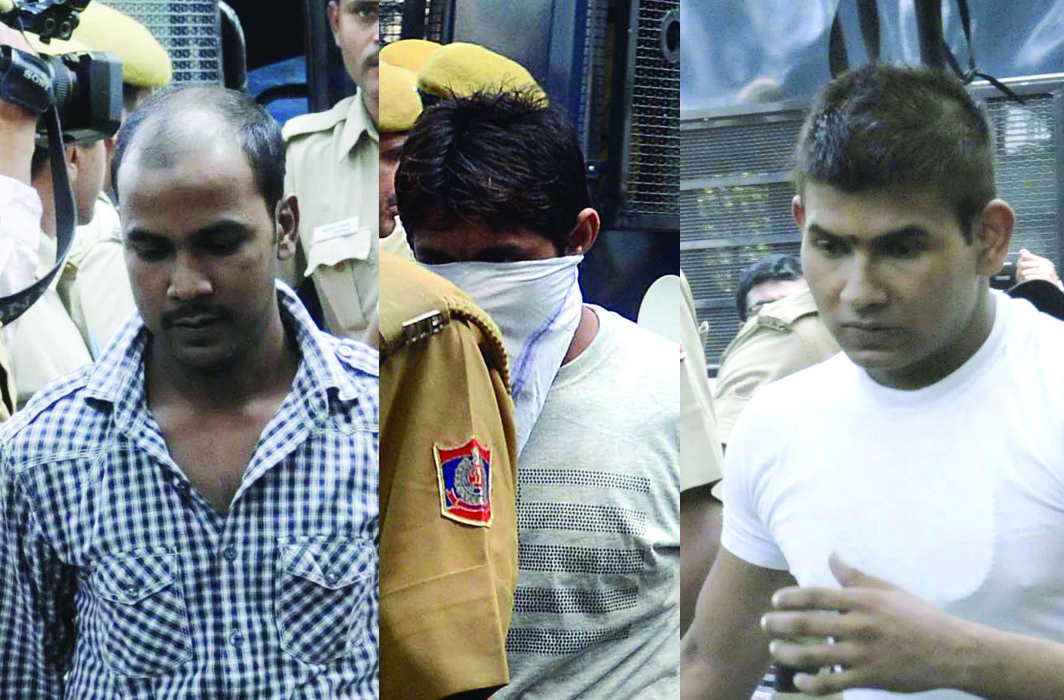Students protesting at Vijay Chowk after the Nirbhaya gangrape-murder in 2012/Photo: Anil Shakya
Five years, six months and 23 days after a 23-year-old paramedic student returning from a movie got up on an empty chartered bus in New Delhi’s Saket area and was subsequently brutally raped and murdered by six people, the Supreme Court bench of Chief Justice Dipak Misra and Justices Ashok Bhushan and R Banumathi on Monday (July 9) rejected the review petitions on death sentences filed by Pawan Gupta (31), Vinay Sharma (25), and Mukesh (31), sentenced to death in the murder of Nirbhaya.
The fourth convict, Akshay Thakur (33) has not filed a review petition yet. He has been granted three weeks by the top court
Of the six arrested in the murder, Ram Singh allegedly committed suicide by hanging himself in Tihar jail in 2013. The sixth, a juvenile (just short of 18), was found guilty by the Juvenile Justice Board (JJB) and was sent to three years in probation to a reform home. The juvenile, whose name is not known (legally, he cannot be named) is already out and has melted into the population, carrying his criminal mind and past. Ironically, the juvenile, who was said to be the cruellest of the lot in the murder, has also been given enough vocational training to support himself independently.
Backgrounder
While the 2012 Nirbhaya case has become the centrepiece of all judgments related to violence on women in India, the first instance of the Supreme Court’s capital punishment (to all four accused) verdict, delivered on May 5, 2017, went through several petitions.
Meanwhile, in the six years that have lapsed, India has become virtually the rape capital of the world. Gang rapes and murders, even on girls as young as 8 (the Kathua gang rape and murder case) as horrific as the Nirbhaya case and more, have been reported from across the country.
The general perception was that deterrent legal action was so slow in India that the fear of punishment has all but vanished. Today’s judgment could be one in a series of final verdicts that the public wants to be fast-tracked.
Timeline
December 16, 2012: 23-year-old paramedic student, now known as Nirbhaya, returning home with her friend in Delhi got a lift from a chartered bus (empty, except for driver and helpers) and is gang-raped and killed by six men. She got the bus from the Saket area after watching a movie. Her friend was brutally beaten up and left for dead.
December 17, 2012: Delhi Police identify four men who raped and assaulted her — bus driver Ram Singh, his brother Mukesh, Vinay Sharma and Pawan Gupta. Doctors declared the woman suffered grave internal injuries.
December 18, 2012: Ram Singh and three others are arrested.
December 29, 2012: Nirbhaya succumbs to her injuries at Mount Elizabeth Hospital in Singapore where she was transported by the government for further treatment.

December 21, 2012: Accused juvenile is arrested from Anand Vihar bus terminal in Delhi. The woman’s friend identifies Mukesh as one of the culprits. Police conduct raids in Haryana and Bihar to nab the sixth accused, Akshay Thakur.
December 22, 2012: Akshay Thakur is arrested in Bihar and brought to Delhi. Victim records her statement before the SDM in hospital.
January 2, 2013: The then Chief Justice of India Altamas Kabir inaugurates fast track court for speedy trial in sexual offence cases.
January 3, 2013: Police files charge-sheet against five adult accused for offences including murder, gang rape, attempt to murder, kidnapping, unnatural offences and dacoity.
February 28, 2013: Juvenile Justice Board (JJB) frames rape, murder charges against the juvenile accused.
March 11, 2013: Bus driver Ram Singh is found hanging in his cell in Tihar jail.
August 31, 2013: JJB convicts the juvenile for gang rape and murder and awards three years term at a probation home.
September 13, 2013: Fast track court awards death to all four convicts. Trial court refers the case to Delhi High Court for confirmation of death sentence.
March 13, 2014: The Delhi High Court justices Reva Khetrapal and Pratibha Rani uphold the death sentences awarded to the four convicts.
December 18, 2015: Delhi High Court refuses to stay the release of the juvenile. He walks out of a correction home after spending three years.
April 3, 2016: Supreme Court begins hearing in the case.
April 8, 2016: Senior advocates Raju Ramchandran and Sanjay Hegde appointed amicus curiae.
May 5, 2016: SC upholds death penalty of four accused – Akshay Thakur, Vinay Sharma, Pawan Gupta and Mukesh Singh.
November 7, 2016: Advocate Raju Ramchandran argues for sentencing order to be set aside.
November 28, 2016: Advocate Sanjay Hegde argues against reliability of evidence in the case.
February 3, 2017: Supreme Court decides to rehear the case on the sentencing aspect, after the petitioners contend that there has been violation in procedure.
March 6, 2017: All the accused submit additional affidavits in court.
March 27, 2017: The SC reserves verdict after nearly a year of hearing the case.
May 5, 2017: The Supreme Court pronounces judgement in the case upholding the death sentence of all 4 accused.
November 13, 2017: The convicts appeal to the Supreme Court to review their sentence claiming that it was cold-blooded killing in the name of justice.
May 4, 2018: Supreme Court upholds the order on the plea of two convicts seeking a review of its 2017 verdict upholding the death penalty awarded to them.
—India Legal Bureau


